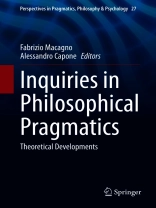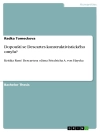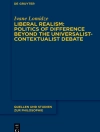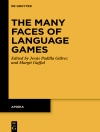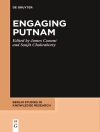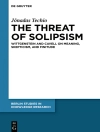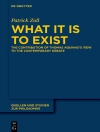Together with the volume “Inquiries in philosophical pragmatics: Linguistic and theoretical issues, ” this book provides a journey through the more recent developments of pragmatics, considering both its philosophical and linguistic nature. This first volume is devoted to the theoretical models developed from a philosophical perspective, including both the newest advances of the classical theories and approaches, and pioneering and interdisciplinary ideas proposed to face the challenges of the fields and areas of practice and analysis. The topics investigated, which include implicatures, reference, presupposition, speech acts, metaphor, relevance, and common ground, represent the core of the state of the art in philosophical pragmatics. Research on these matters have been continuously changing the way that we can look at them. This book serves as a collection of works from the most eminent authors who represent the theoretical developments of the approaches that defined this field, together with the new philosophical insights coming from more applied disciplines such as argumentation, discourse analysis, or linguistics. The combination of these two perspectives provides a unique outline of the current research in pragmatics.
Tabela de Conteúdo
Introduction (Macagno, M. & A. Capone.).- Chapter 1. Three Mistakes About Semantic Intentions (Devitt, M.).- Chapter 2. ‘Few’, ‘A Few’, and ‘Only’: Negative Quantifier Noun Phrases and Negative Polarity Items — the Horn-Atlas Debate 1991 – 2018 (Atlas, J.).- Chapter 3. Prospective Reference (Saka, P.).- Chapter 4. Interpretation Of Copredicative Sentences: Rich Underspecification Account (Ortega, M.).- Chapter 5. Speech-act-theoretic explanations of problems of pure indexicals (Oishi, E.).- Chapter 6. First person implicit indirect reports in disguise (Capone, A.).- Chapter 7. Meaning, Reasoning, and Common Knowledge (Werner, R.).- Chapter 8. Assessing Dialectical Relevance Using Argument Distance (Walton, D.).- Chapter 9. The communicative functions of metaphors between explanation and persuasion (Rossi, Macagno.).- Chapter 10. Stereotypes favour implicatures and implicatures smuggle stereotypes: the case of propaganda (Lombardi Vallauri, E.).
Sobre o autor
Fabrizio Macagno (Ph.D. UCSC, Milan, 2008) works as a researcher and invited auxiliary professor at the Universidade Nova de Lisboa. He is author of more than eighty papers on definition, presupposition, argumentation schemes, and dialogue analysis published in major international peer-reviewed journals such as the Journal of Pragmatics, Intercultural Pragmatics, Argumentation, and Philosophy and Rhetoric. His most important publications include the books Argumentation Schemes (CUP 2008), Emotive Language in Argumentation (CUP 2014), and Interpreting Straw Man Argumentation (Springer 2017).
Alessandro Capone is full professor of general linguistics at the University of Messina in the Department of Cognitive Science. He has a doctorate from the University of Oxford, where he studied with James Higginbotham and Yan Huang, and one from the University of Palermo, where he studied with Franco Lo Piparo. He has two habilitations as full professor of linguistics and philosophy of language. He is chief editor of the Springer series Perspectives in Pragmatics, Philosophy, Psychology. He is co-editor for the journal Pragmatics and Philosophy, Mouton De Gruyter. He has published a monograph for Springer, entitled The Pragmatics of Indirect Reports: Socio-Philosophical Considerations. (2016). He has published papers in Lingua, Linguistics, Pragmatics and Cognition, Pragmatics and Society, Journal of Pragmatics, Intercultural Pragmatics, Australian Journal of Linguistics, La Linguistique, Argumentation, RASK: International Journal of Language and Communication, International Journal of Language Studies, Oxford working papers in Linguistics, Reti Saperi Linguaggi, and Lingua e Stile. He has published sixteen volumes with CSLI, University of Chicago Press, Springer, Clueb (Bologna), and ETS (Pisa). He is a member of the editorial boards for Lingua, Journal of Pragmatics, Intercultural Pragmatics, Pragmatics and Society, International journal of Language Studies, and Brill Research Studies in Pragmatics.
